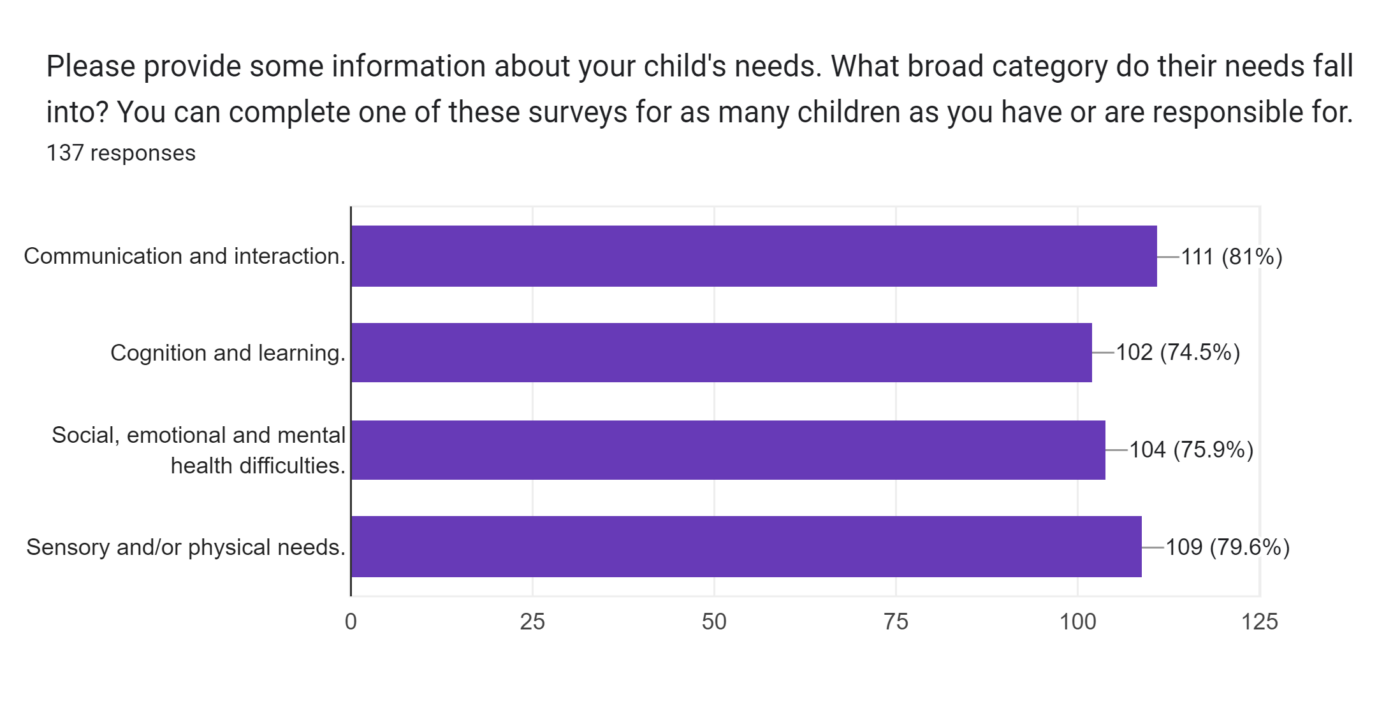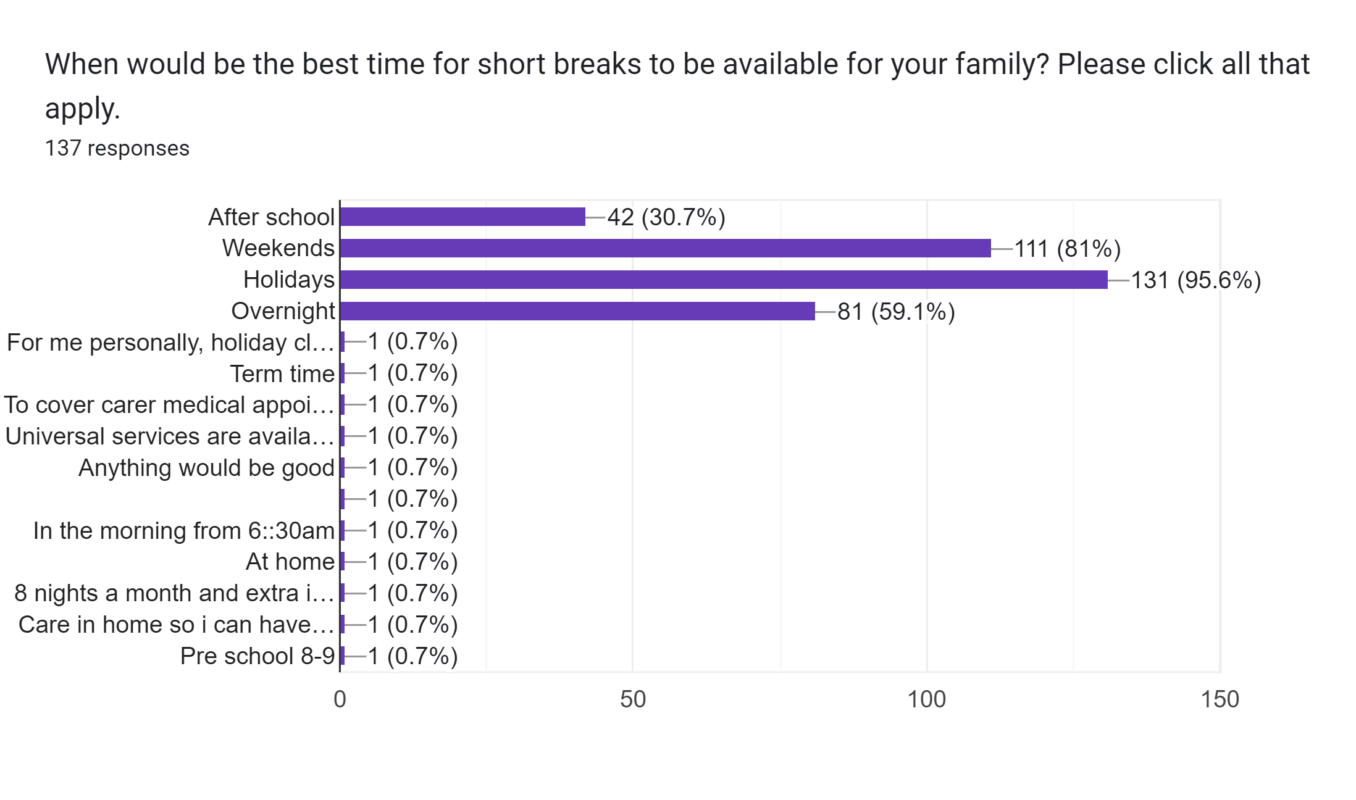The survey responses from parents and carers of children with disabilities provide important insight into the unique needs of these children and the multifaceted challenges faced by their families. This is a summary of the responses received, as well as some recommendations of actions that could be taken to improve the local offer of Short Breaks in Birmingham.
Please choose from the following links to view the results for each question.
- If you would like to tell us more about your child’s needs, please do so here
- What are the biggest challenges you face as a parent/carer of a disabled child?
- What kind of short breaks support would make a real difference to your family?

Needs of the Children
- Complex Needs: Many of the children have complex and diverse needs, requiring varying levels of support and specialised environments.
- Non-Verbal Communication: A significant number of children rely on non-verbal means of communication, necessitating tailored approaches to understanding and interacting with them.
- Sleep Difficulties: Many children have trouble sleeping, further compounding the challenges faced by their parents.
- Physical Disabilities: Physical disabilities such as cerebral palsy and quadriplegia require specialised care, rehabilitation, and accessible environments.
- Neurodevelopmental Disorders: Autism, ADHD, and other developmental disabilities present unique challenges in terms of education, social interactions, and daily functioning.
- Sensory Processing Issues: Sensory processing issues can make it difficult for children to manage and respond to sensory inputs, affecting their overall well-being.
- Mental Health Difficulties: Many children also face mental health challenges, such as anxiety, depression, and emotional dysregulation, requiring specialised care and support.
- Learning Disabilities: Learning disabilities can hinder academic progress and require tailored educational interventions.
Challenges Faced by Parents
- Constant Care: Parents often provide constant care for their children, with little respite, leading to physical and emotional exhaustion.
- Behavioural and Emotional Needs: Managing the behavioural and emotional needs of children with disabilities can be demanding and requires specialised skills and strategies.
- Complex Systems: Navigating the complex systems of healthcare, education, and social services can be overwhelming and time-consuming for parents.
- Emotional Toll: Caring for a child with a disability can take a significant emotional toll on parents, leading to feelings of isolation, stress, and grief.
- Financial Strain: The financial burden of caring for a child with a disability can be substantial, including medical expenses, therapy costs, and specialised equipment.
- Lack of Suitable Provision and Respite Care:
- Parents and carers struggle to find suitable provision and respite care that caters to their child’s unique needs.
- Waiting lists for respite care and services are long, and the support offered is often inadequate.
- This shortage of services makes it difficult for parents to continue working and attend to their own needs, leading to burnout and isolation.
- Communication Difficulties:
- Non-verbal children present significant communication barriers, making it challenging for parents to understand their child’s needs and express their own.
- This communication gap can lead to frustration and emotional distress for both parents and children.
- Financial Burden:
- Raising a child with a disability often involves substantial additional costs for medical care, therapies, and assistive devices.
- Fighting for services and support can be a time-consuming and emotionally draining process.
- Emotional Toll:
- Parents and carers experience immense emotional strain, including feelings of exhaustion, burnout, and isolation.
- Lack of time to attend to their own needs and a lack of support from professionals and the community can exacerbate these challenges.
- Social Isolation:
- Parents and carers often feel excluded from social activities and gatherings due to their child’s needs.
- This social isolation can lead to feelings of loneliness and a lack of understanding from others.
Service Specification Recommendations:
Based on these challenges, the following recommendations may be made for the redesign of short break services in Birmingham:
- Develop a range of flexible and accessible respite care options that cater to the diverse needs of children with disabilities.
- Provide training and support to professionals working with children with disabilities to improve communication and understanding.
- Offer financial assistance to families to help cover the costs of medical care, therapies, and assistive devices.
- Establish and signpost to support groups and networks for parents and carers to provide emotional support and a sense of community.
- Raise awareness in the community about the needs of children with disabilities and their families to promote inclusivity and understanding.
Lack of Support:
- Insufficient staff to support children’s needs, especially for non-verbal and wheelchair-using children.
Accessibility Issues:
- Age restrictions, lack of accessibility features, and a lack of understanding among session leaders.
- Limited or non-existent disabled toilet facilities with beds to change children.
Communication Challenges:
- Difficulty in communication for non-verbal children and the need for qualified professionals to understand their needs.
Affordability:
- High costs of activities and lack of funding for short breaks services.
Lack of Inclusive Services:
- Mainstream activities are not designed for children with special needs, leading to sensory overload and anxiety.
Recommendations:
- Increase Staffing and Training:
-
- Provide adequate and well-trained staff to support children with disabilities in community settings.
- Offer specialised training for staff to understand the needs of children with complex disabilities.
- Improve Accessibility:
-
- Ensure physical accessibility by providing ramps, elevators, and accessible toilets.
- Offer sensory-friendly spaces and activities tailored to children with sensory differences.
- Promote Communication Support: Provide communication aids and alternative communication devices to facilitate communication.
-
- Ensure staff is trained in using communication devices and other communication strategies.
- Offer Financial Assistance:
-
- Provide financial assistance to families to cover the costs of activities.
- Explore partnerships with organisations that offer subsidised or free activities for children with disabilities.
- Develop Inclusive Programming:
-
- Design inclusive activities and programs that cater to the diverse needs of children with disabilities.
- Collaborate with disability organisations and families to ensure inclusivity.
- Raise Awareness and Outreach:
-
- Conduct awareness campaigns to educate the public about the needs of children with disabilities.
- Reach out to families of children with disabilities to understand their specific needs and preferences.
- Provide Respite Care:
-
- Offer respite care services to give parents and carers a break while their children participate in activities.
- Ensure respite care providers are trained to meet the needs of children with disabilities.
- Monitor and Evaluate:
-
- Regularly monitor the effectiveness of short break services in meeting the needs of families.
- Collect feedback from families and use it to make improvements.
Summary of Responses. Some key themes include:
- Lack of awareness: Many parents/carers were not aware of the short breaks services available to them. This suggests a need for better communication and outreach to families.
- Insufficient provision: Several parents/carers expressed that the current level of short breaks provision is not sufficient to meet the needs of their families. They highlighted the need for more frequent and longer breaks.
- Lack of support for disabled children: Some parents/carers raised concerns about the lack of support for disabled children during school holidays. They emphasised the need for more inclusive and accessible activities and programs.
- Waiting lists: Parents/carers reported experiencing long waiting lists for short breaks services. This suggests a need to increase capacity and improve access to services.
- Need for more flexibility: Several parents/carers highlighted the need for more flexible short breaks services that can accommodate the individual needs of families. This includes offering a range of different types of breaks and allowing families to choose the times and locations that work best for them.
Proposed Follow-up Questions
Based on the responses received, the following follow-up questions could be asked to further explore the experiences and needs of parents/carers of children with disabilities in Birmingham:
- Can you provide more specific details about the short breaks services you have accessed and what you liked and disliked about them?
- What types of short breaks services would be most beneficial to your family?
- What are the specific challenges you face in accessing short breaks services?
- What are your suggestions for improving the quality and availability of short breaks services in Birmingham?
- How would you like to be involved in the redesign and ongoing delivery of short breaks services in Birmingham?
- Regular and Consistent Respite:
- Parents emphasise the significance of regular respite, not limited to occasional breaks every six months.
- Services such as “Our Special Angels” and “Wilson Stuart School” serve as positive examples of successful programs.
- Regular respite allows parents to recharge, reduce stress, and maintain their physical and mental well-being.
- Holiday Support:
- School holidays present increased challenges and require additional support for parents of children with disabilities.
- Financial assistance is requested to enable families to attend holiday clubs or programs.
- Services should be available on weekends and holidays to accommodate variations in family schedules.
- Accessible and Affordable Services:
- Parents seek services that are located locally, consistent, and affordable.
- Involvement in decision-making processes and culturally sensitive support are crucial for families.
- Affordable services ensure that families from diverse socioeconomic backgrounds have equal access to support.
- Safe and Fun Environments:
- Parents prioritise the happiness and safety of their children during short breaks.
- Services should provide nurturing and stimulating environments that promote positive experiences for children.
- A safe and fun environment allows children to develop social skills, build confidence, and enjoy their time away from home.
- Targeted Support:
- Parents express a need for targeted services tailored to the specific needs of children with disabilities.
- Services should be designed with an understanding of the unique challenges and requirements of different disability types.
- Targeted support ensures that children receive appropriate interventions and care during short breaks.
- Inclusive Holiday Activities:
- Holiday activity clubs that cater specifically to children with special educational needs, such as “Our Special Angels,” are highly valued by parents.
- Inclusive holiday activities promote socialisation, skill development, and a sense of belonging for children with disabilities.
- Inclusive activities also challenge societal perceptions and foster a more understanding and accepting community.
- Accessible Accommodations:
- Some parents request accessible caravan hire for family adventures.
- Accessible accommodations enable families to enjoy outdoor activities and create lasting memories together.
- Accessible accommodations ensure that children with disabilities have the same opportunities for leisure and recreation as their peers.
- Flexibility and Multifunctionality:
- Parents seek flexible and multifunctional services that can adapt to their changing needs.
- Services should be able to accommodate different types of disabilities, family compositions, and support requirements.
- Flexibility and multifunctionality allow services to meet the diverse and evolving needs of families over time.
- Specialist Support:
- Parents emphasise the importance of specialist services that understand the unique challenges of raising a child with a disability.
- Specialist support provides parents with access to knowledgeable and experienced professionals who can offer guidance, advice, and practical assistance.
- Specialist support helps families navigate the complexities of caring for a child with a disability and access appropriate resources.
- Couples Short Breaks:
- Parents express a desire for couples’ short breaks with care provided for their child.
- Couples’ short breaks offer parents an opportunity to reconnect, strengthen their relationship, and recharge as a couple.
- Couples’ short breaks contribute to the overall well-being of families and help prevent parental burnout.
- In-Home Support:
- Parents request in-home supervision and respite leading to overnight respite.
- In-home support allows children to remain in their familiar environment and reduces the stress associated with transitions.
- In-home support also provides flexibility for families and enables them to maintain their daily routines.
- Social Interaction:
- Parents/carers emphasised the importance of opportunities for their children to socialise with other children, both with and without disabilities. They believe that this helps their children develop essential social skills, learn from others, and build friendships.
- Independence:
- Parents/carers want their children to develop independence skills that will enable them to live more fulfilling lives. They believe that short breaks services can play a vital role in supporting their children’s development by providing opportunities to practice self-care, decision-making, and other independent living skills.
- Fun and Enjoyment:
- Parents/carers want their children to have fun and enjoy themselves when on short breaks. They believe that this is important for their children’s mental and emotional well-being. They would like to see a variety of activities and outings offered during short breaks that cater to their children’s interests and abilities.
- A Break for Parents/Carers:
- Parents/carers emphasised the need for a break from the demands of caring for their children. They believe that short breaks services provide them with an opportunity to recharge, rejuvenate, and continue caring for their children effectively.
Specific Suggestions for Improving Short Breaks Services:
- Flexibility:
- Parents/carers want short breaks services to be more flexible to accommodate their families’ diverse needs. They suggest offering a wider range of services, including varying hours of operation, locations, and types of activities. They also want the ability to use short breaks funding more flexibly to meet their specific needs.
- Accessibility:
- Parents/carers want short breaks services to be more accessible to their families. They suggest locating services in their local communities, making them affordable, and ensuring that they are available to children of all ages and abilities.
- Quality:
- Parents/carers want short breaks services to be of a high quality. They suggest staffing services with qualified and experienced professionals, ensuring a safe, clean, and well-equipped environment, and providing regular training and development opportunities for staff.

Conclusion
The findings of this survey underscore the need for Birmingham Council to re-evaluate and improve its short breaks services to better meet the needs of families of disabled children. The council should consider the recommendations provided by parents and carers, including making services more flexible, accessible, and of a higher quality. By addressing these concerns, the council can significantly enhance the lives of disabled children and their families in Birmingham.

